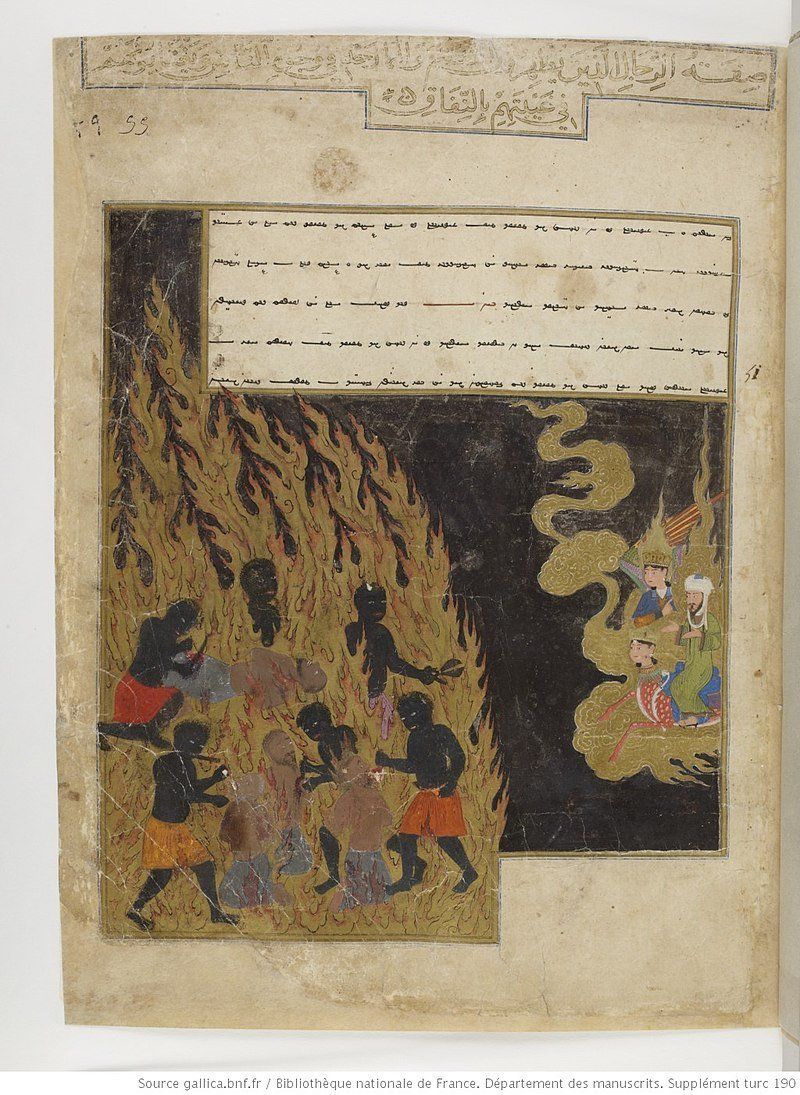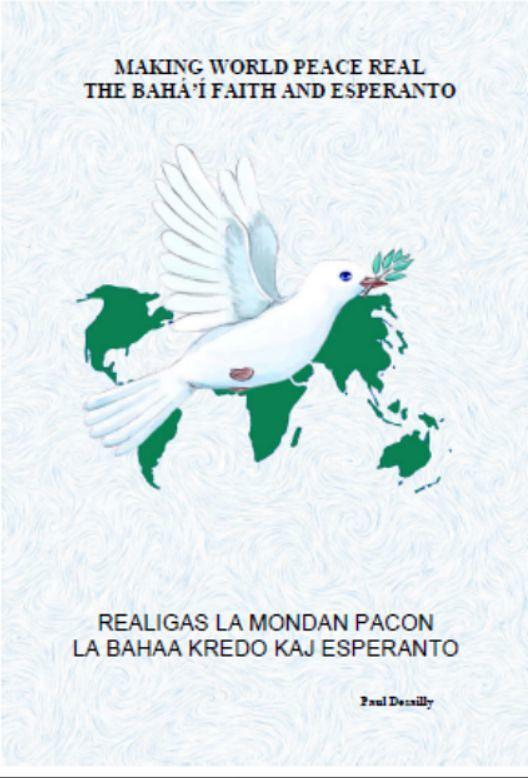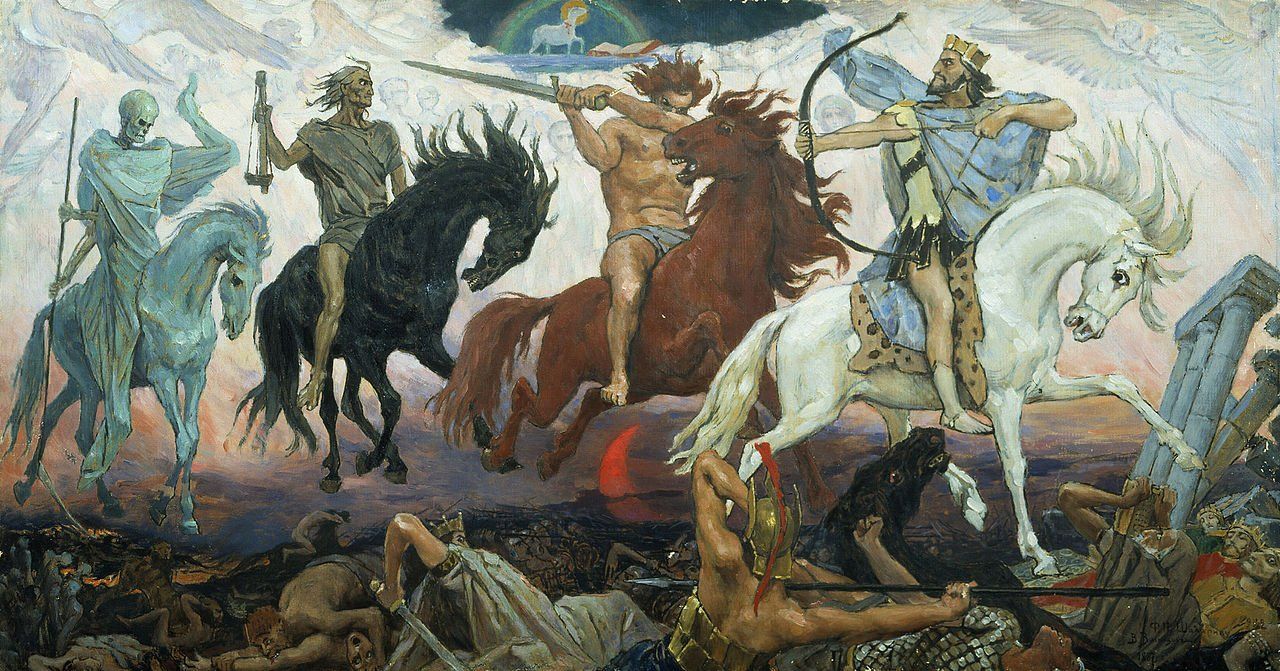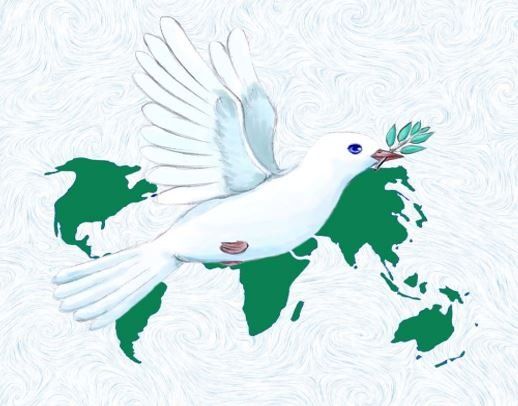From Babel to Baha'i
May 26, 2020
Tower of Babel - 1563 Pieter Bruegel the Elder (c.1525 - 9th September 1569)
FROM BABEL (FB2B) PAUL DESAILLY, ADELAIDE. May 2020 TO BAHÁ’Í AN ABRIDGEMENT
part 1: https://gum.co/gDehr
part 2: https://gumroad.com/l/TbtCp
www.bahaigardens.org.il
- Haifa, Israel
FRIENDS!
IGNORE ME, NOT AB
Were Bahá’ís allowed to wager I’d bet London to a brick you don’t know that Dr. Ludoviko Lazaro Zamenhof died about one hundred years ago, against the odds his supporters nearly pulled off a miracle after the Great War for every school kid in the world, that a world peace movement is associated with his international auxiliary language which remains to this day strictly neutral on matters party political and religious and that in 2017 he became a UNESCO nominee.
One million young people today study Esperanto online at Duolingo (that’s just via the English version!) https://www.duolingo.com/course/eo/en/Learn-Esperanto-Online
because Wikipedia and Google Translate, among others, see the writing on the wall: https://eo.wikipedia.org/wiki/Vikipedio:%C4%88efpa%C4%9Do
Linking Esperantism with the Bahá’í Faith is more than an avocation for me! So, I’ve penned a few lines on the subject which in no way purport to project an official position on the part of either movement. Don’t shoot the messenger, mes amis! My young sons would grieve terribly for their old papa. Do please weigh in though to refute, confute or even to dispute to a degree; a few of our coreligionists have tried – unsuccessfully as yet – and we’re all cool about that!
No rational being expects perfection when an amateur takes up the pen. Please feel free to correct the penpersonship of this scrivener, especially in regard to a forty-page bilingual booklet, as an FB2B-enclosure profiling the Bahá’í Faith, and to a Seminar paper consisting of three dozen pages vis-à-vis the position of the Universal House of Justice on language; it starts on page 33 of From Babel to Bahá’í (FB2B). Though some contractual obligations are complex and restricting, a handy facet of electronic publishing at Gumroad (San Francisco) is the ease in which authors facilitate emending and polishing of their work:
At long last then From Babel to Bahá’í – whose initial goal is to promote consultation on the principle of a universal auxiliary language en route to (hopefully!) Esperantizing six or seven million Bahá’ís, a process which will vastly accelerate propagation of the Faith to all and sundry – is finally ready. My latest book on the language principle starts with a Biblical warning regarding the sin of pride at Babel and closes with a sterner Divine chastisement restated for our era as Rome burns badly and society implodes before unbelieving eyes:
Gleanings From the Writings of Bahá’u’lláh, (cxxxii): “Purpose of the one true God…”
THE FINAL WARNING – “WHOSE FLAMES NONE CAN QUENCH”
Gleanings From the Writings of Bahá’u’lláh, (clix): “Attain unto Perfect Liberty…”
Book Contents
In 1913, in Paris, in person – as recorded (a) in multifarious metropolises and in various Bahá’í works including primary sources recently translated into English and sanctioned by the Universal House of Justice (b) in authoritative books such as Bahá'u'lláh and the New Era and (c) in non-Bahá’í secondary sources that confirm his instructions – Sir ‘Abdu’l-Bahá Abbas asks us all to study Esperanto:
"Now praise be to God that Dr. Zamenhof has invented the Esperanto language. It has all the potential qualities of becoming the international means of communication. All of us must be grateful and thankful to him for this noble effort for in this way he has served his fellowmen well. With untiring effort and self-sacrifice on the part of its devotees, Esperanto will become universal. Therefore, every one of us must study this language and spread it as far as possible, so that day by day it may receive a broader recognition, be accepted by all governments and nations of the world and become a part of the curriculum in all the public schools.” (*p45)
‘Abdu’l-Bahá extends to the Esperanto community congratulatory words of praise, as rare and appreciative on his part as to express gratitude in the extreme:
“I am extremely grateful to you, and thank you for these lofty aims, for you have gathered at this [Esperanto] banquet to further this language. Your hope is to render a mighty service to the world of humanity, and for this great aim I congratulate you from the bottom of my heart.”
‘Abdu’l-Bahá, France, 1913
Thanks largely to Dr Greg Meyjes’ diligence and polyglottal talents the primary publishing house of the Bahá’í world community has published in 2015 a splendid compilation on the unique principle of a universal auxiliary language:
The Greatest Instrument for Promoting Harmony and Civilization (+)
As a result, readers of English finally realize and may hardly deny, just as certain scholars of Farsi have known for many decades, that in various European and North American capitals ‘Abdu’l-Bahá, not only verbally thanks the Esperantists but also, as attested shortly before World War 1 in an extant document penned in Persian with his signature appended, confirms that appreciation in writing while conveying an incontestable obligation upon the followers of Bahá'u'lláh (as individuals) that we engage Esperanto, prophesying even, that all Bahá’ís will study Dr Zamenhof’s language of world peace as a religious duty:
“His Honor, Dr. Fareed – Upon him be Baha-el-Abha!
O servant of the Holy Threshold! You have written in regard to Esperanto and your speech before the Congress. It was appropriate and acceptable. If possible meet with Dr. Zamenhof and show him the Kitab-el-Aqdas (Book of Laws) and translate the verse which concerns the Universal Language and tell him: This clear verse, which was revealed forty-five years ago, will prove the cause of spreading your Universal Language in all the East. The Bahais shall consider the study of this language as an incumbent duty upon them, and it will be to them a religious duty. Therefore, men, women, and children, all will acquire it.” [Emphasis by PD]
Translated from an extant letter in Farsi authorised by ‘Abdu’l-Bahá. (+) p. 15
See too British Esperantist, vol 7 no 84 1911 http://anno.onb.ac.at/cgi-content/anno-plus?aid=e1d&datum=1911&size=45&page=245
‘Abdu’l-Bahá’s promise re promulgation of Zamenhof’s language “in all the East” is coupled to the last page of Bahá'u'lláh’s Kitáb-i-Aqdas (Book of Laws) 1873:
"O members of Parliaments throughout the world! Select ye a single language for the use of all on Earth, and adopt ye likewise a common script. God, verily, maketh plain for you that which shall profit you and enable you to be independent of others. He, of a truth, is the Most Bountiful, the All-Knowing, the All-Informed. This will be the cause of unity, could ye but comprehend it, and the greatest instrument for promoting harmony and civilization, would that ye might understand! We have appointed two signs for the coming of age of the human race: the first, which is the most firm foundation, We have set down in other of Our Tablets, while the second hath been revealed in this wondrous Book" (* pp42 & 73)
In a letter written officially on behalf of Shoghi Effendi to an individual, 30 January 1926, as translated from the Persian by Dr. Gregory P. Meyjes for his illuminating work sanctioned by the Universal House of Justice, (The Greatest Instrument for Promoting Harmony and Civilization) a long standing and grossly damaging misconception long held by many western Bahá’ís is at last put to rest:
“With Esperanto the case is different as it is an easy language in both its written and spoken forms. Were the friends [i.e. the Bahá’ís] to learn this language the result would be to engender a greater feeling of love and unity amongst them and to facilitate the promotion of the Teachings revealed for the New Age by the Glorious King. Exert your utmost endeavor, then, in this praiseworthy undertaking, so that you may be instrumental in scattering abroad the fragrances of God’s Manifestation and that you may impart joy and gladness to the hearts of the friends.” (+) page 36
Apparently, then, by the mid-twenties Esperantists had already allayed ‘Abdu’l-Bahá’s oft and overly referenced concern from 1911 about Esperanto’s degree of difficulty! – “Esperanto as it stands is very difficult for some people.” – In other words, astoundingly, yet again, habitual reference to ‘Abdu’l-Bahá’s one-time concern as a reason for disengaging Esperanto has been invalid for 94 years, though understandably, little realized as such by non-Farsi speaking Bahá’ís!
The dead weight damage of monumental misinterpreting inflicted upon rank and file believers by anonymous Bahá’í editors with authority in the jurisdiction of the USA alone, is globally reversed by apprehending a simple distinction between a Universal Language and a universal auxiliary language. For generations Bahá’í administrators have cited the Master way out of context from page 95 of ‘Abdu’l-Bahá in London in their support of an institutional stance (not found in the original text of the classic Bahá’í book in question nor composed subsequently by the Universal House of Justice but misleadingly found now, and in many editions, of Baha’u’llah and the New Era) that the Bahá’í Faith as a religious organisation is not committed at present to any living or artificial tongue: "The love and effort put into Esperanto will not be lost but no one person can construct a Universal Language.” ALERT: Albeit ingenious, and thus acknowledged by notables aplenty, Esperanto remains, as ever, an auxiliary tongue not designed to supplant national languages nor as a contender re Bahá’u’lláh’s prophecy about languages of a distant time when “efforts must be made to reduce them to one”. ( # See p.14 and FB2B p.64) It’s clear too, as the Guardian’s 1926 letter shows, that Dr. Zamenhof had relinquished control of Esperanto and had welcomed improvements suggested during his lifetime, as implemented by the Esperantists themselves, who, by the way, continue in that consultative process today.
(Misleadingly is a fair description given that to this day readers of BNE remain none the wiser as to who composed wording appended to Baha’u’llah and the New Era and who erroneously linked ‘Abdu’l-Bahá’s words in London about a single planetary language of the distant future with the need right now for a universal auxiliary language. (*pp 43,54} Clarifying scholarship re his London letter successfully passed the arduous criteria of Bahá’í review in 2006. (FB2B p.73) Shockingly, disgracefully, that scholarship has gone as equally unheeded as the work cited here by Dr. G Meyjes in collaboration with Dr. W Momen.)
On the eve of destruction as though on the brink of war East and West face the abyss! In the former the source of a world-devouring fire, whose violence none can quench, is religious fanaticism and hatred. In the latter, materialism, racism and excessive liberty lead to sedition, whose flames none can quench. Divine power alone delivers humankind from these inexorable and desolating afflictions: Now at hand is “that millennial day, which has been prophesied by the past prophets and seers, that day in which, it is said, the wolf and the lamb will drink from the same fount, the lion and the deer graze in the same meadow. The signification of this Holy Writ is that the contesting races, warring nations, inimical religions, will come to each other in the spirit of love and amity... The unification of language will transform the world of humanity into one world; the unification of language will do away with the misunderstandings between religions, and the unification of language will bring together the East and the West in the spirit of fellowship and love.” (* p36)
Sir ‘Abdu’l-Bahá Abbas K.B.E. in Edinburgh (the Athens of the North) Scotland, U.K. 1913.
Thorough and transparent consultation in and beyond the Bahá’í community, together with much enhanced interaction with the Esperanto movement, are vital steps toward making world peace real and extirpating perceptions of hypocrisy faced by the followers of Bahá'u'lláh.
BE PART OF THE SOLUTION
I beseech God a circuit-breaking miracle to accelerate a long-cherished wish of the Master and the Guardian, that fuses by osmosis two movements whose ideals often overlap: A new generation of Bahá’ís – captive to no national culture or language or charismatic leaders – has no choice in conscience, having independently investigated as individual believers the truth of the auxiliary language principle, other than to arise and take up a clearly defined duty to sincerely engage Dr. Zamenhof’s language of world peace. A reciprocal blessing consists in this, that as we Bahá’ís practise serious investigation of the principle itself, irrespective of the institutional question regarding eventual selection, and respond to “the repeated and emphatic admonitions” of ‘Abdu’l-Bahá that we study and disseminate Esperanto far and wide, (* p62) a thirty-year stasis in enrolments in our own congregation will finally end, Inshallah, never to be endured again. (FB2B, p.66; PROOF for the layperson, pp 62-67: https://gumroad.com/l/RRSCR)
Shoghi Effendi says that the people of the world are ever watching the followers of Bahá’u’lláh; he speaks of the love, peace and unity that we Bahá’ís must exude “in words as mild as milk” as a precondition for teaching our Faith, while he notes however, that the fundamental Bahá’í principles and moral teachings must at times be forcibly stressed (FB2B pages 34,35,42) and be seen by the public as offering and producing something better than what it already possesses:
“If, for example, the non-Bahá'ís should ask the friends, ‘What differentiates you from all the rest?’, and if, to this, the friends answer, ‘In the pathway of our love for the Centre of our Faith, we would sacrifice our lives and possessions,’ those of the civilized world would never be content with such a reply. They would merely say: ‘Your love, your sacrifice for a single individual cannot possibly serve as a remedy for the chronic ills which plague society today.’ If the friends then answer: ‘Our religion provides principles and moral teachings whose value the wisest of the day cannot deny,’ this will be the response: ‘Noble principles and teachings will produce an effect on human character, and heal the mortal sicknesses which afflict society, only at such time when those who claim to believe in and support them are themselves the first to act upon them, and to demonstrate and incorporate the value and the benefits of them in their own everyday transactions and lives.’ Unless this comes about, there is nothing to distinguish the Bahá'ís from the rest.”
Words of Shoghi Effendi at the outset of his long ministry. See, Bahíyyih Khánum, pp 203-204
“One thing and only one thing will unfailingly and alone secure the undoubted triumph of this sacred Cause, namely, the extent to which our own inner life and private character mirror forth in their manifold aspects the splendor of those eternal principles proclaimed by Bahá’u’lláh.” Shoghi Effendi, 24 September 1924, Bahá’í Administration p66
https://www.duolingo.com/course/eo/en/Learn-Esperanto-Online
- Free Esperanto course on line
A CONCURRENCE OF EVENTS IN THE BAHA’I BICENTENARY OF 2017
This special year, as you well know, the bicentennial of the birth of the Lord of the Age and His ascension 125 years ago in 1892, is commemorated. http://www.bahai.org/bahaullah/
“The Promised One of all the peoples of the world hath appeared. All peoples and communities have been expecting a Revelation, and He, Baha’u’llah, is the foremost teacher and educator of all mankind.” Abdul-Baha opens chapter 1 of Baha’u’llah and the New Era.
Exactly one century since the passing of its founder, a global movement whose members “share many ideals” * with the Baha’is, is this year commemorating the life of Dr. Zamenhof, (1859–1917) whose admiration for our religion, Baha’is rejoice in: "The personage of Abdu’l-Baha and his work I very highly esteem: I see in him one of the greatest benefactors of mankind." https://en.wikipedia.org/wiki/L._L._Zamenhof
(*pp 19–28) https://en.wikipedia.org/wiki/Homaranismo
Added poignancy comes to mind in the life-story of his daughter, Lidia Zamenhof, (1904–1942) (*p29) whose achievements are adumbrated in the same House letter just cited: “Lidia, was so devoted a follower of Baha’u’llah.” In this momentous year 2017, the 75th anniversary of her tragic murder at the hands of the Nazis, the British Library is chronicling her memory at some length and inviting you to apprehend and then realize her legacy by reacting to Prof. Renato Corsetti’s article titled: Lidia Zamenhof, a cosmopolitan woman and victim of the Holocaust : http://blogs.bl.uk/european/2017/01/lidia-zamenhof-a-cosmopolitan-woman-and-victim-of-the-holocaust.html
http://aea.esperanto.org.au/ftp-uploads/ESK-127-jun2017.pdf
p. 16-17: Esperanto rendering of British Library’s article.
Additional material commemorating the life of Lidia Zamenhof is available at : PROOF – FOR THE LAYPERSON https://gumroad.com/l/RRSCR
pp 75, 119 - 123 FROM BABEL TO BAHA’I (FB2B) https://gum.co/gDehr
pp 10, 59 – 62. Wikipedia and Vikipedio: https://en.wikipedia.org/wiki/Lidia_Zamenhof
https://eo.wikipedia.org/wiki/Lidja_Zamenhof
* Universal House of Justice letter of 17 September 1986 to the Baha’is of Europe. (* p89)
Writing in 1946 in an official capacity, Shoghi Effendi, as head of the Faith and its sole Guardian, advised the western world’s primary Baha’i administrative centre, in Chicago: Heartily approve nation-wide observance for dauntless Lidia Zamenhof. Her notable services, tenacity, modesty and unwavering devotion fully merit high tribute from American believers. Her death is a great loss, as she was so well able to serve and to teach in different languages and different countries. It seems too terrible to contemplate what her end must have been!
Lidia Zamenhof 29 Jan 1904 – 5 Sep 1942
All the while rallying her fellow Jews in the Warsaw Ghetto and with head held high in the death camp at Treblinka, 120 kilometres north-east of the Polish capital, Lidia remained steadfast to Baha'u'llah and the ideals of Esperantism, a multiracial, multi-faith, multicultural, pacifist movement of all classes, ideologies and nationalities founded by her illustrious father (“the famous Zamenhof” to borrow the Guardian’s epithet) whose auxiliary international language she championed in two continents. Both Zamenhofs referenced here spoke most highly indeed of the Baha’i Faith; Lidia signed on as an avowed member in 1925. She lived the Baha’i life to an exemplary degree.
Long live Esperantism! Vivu Esperantismo. Vivu Bahaismo:
http://pages.ucsd.edu/~dkjordan/scriptorium/esperantism.html https://en.wikipedia.org/wiki/Esperanto_movement
Her story is inspirationally recorded in Wendy Heller’s LIDIA–The Life of Lidia Zamenhof Daughter of Esperanto
LIDIA – La Vivo de Lidia Zamenhof Filino de Esperanto
http://www.goodreads.com/book/show/8244768-lidia
(Tradukis: Bernhard Westerhoff)
Particularly during the interbellum, numerous links interweave the Baha’i Faith with Esperanto; none more moving than the youngest child of Klara and Ludoviko Zamenhof. Lidia mastered the world-famous Monsignor Cseh Direct Teaching Method and deployed it unstintingly despite the meagre financial reward and notwithstanding her status as a graduate in the law. https://en.wikipedia.org/wiki/Andreo_Cseh
http://bahaichronicles.org/lidia-zamenhoff/
Klara Zamenhof - https://www.geni.com/people/Klara-Zamenhof/6000000015385867932
Ludoviko Lazaro Zamenhof - https://en.wikipedia.org/wiki/L._L._Zamenhof
Lidia Zamenhof & Martha Root - https://gumroad.com/l/making_world_peace_real/ (*pp29,30)
The foremost Baha’i travel-teaching exponent ever, whether from the East or from the West, whether man or woman, was an American Esperantist of oratorical fluency: It was the inimitable Martha Root (1872–1939 https://en.wikipedia.org/wiki/Martha_Root) who befriended the shy Lidia, shared house, became her confidante and asked her to translate into Esperanto what Shoghi Effendi said would become “the text book of the Faith”, i.e. Baha’u’llah and the New Era. That grand task, along with multifarious Baha’i labours entailing much sacrifice, Lidia accomplished with relish and aplomb, matched only by her expert rendering of Quo Vadis into Esperanto in a translation surpassing even the English version. Both women corresponded regularly with Shoghi Effendi, visited him as pilgrims to the Shrine of the Bab on Mt. Carmel in Haifa, and acknowledged – little appreciated as yet in either movement – that Esperanto amounted to the focal point of their work propagating the Baha’i religion. (See Mabel R. Garis’ Lioness at the Threshold. 232,304)
In scores of countries today several hundred members of the Baha’i Esperanto League, which is an institution sanctioned by the Universal House of Justice and the Universal Esperanto Association, honour Lidia’s legacy by following the instructions of Abdu’l-Baha (1844–1921) as Centre of the Covenant, to wit: every individual follower of Baha’u’llah “must study this language [Esperanto] and spread it as far as possible”, # as recorded for posterity in the Faith’s aforesaid authoritative text book, as composed by the Baha’i Esperantist and Hand of the Cause of God, Dr. John Ebenezer Esslemont of Aberdeen, as translated by Lidia Zamenhof into the International Language (aka Esperanto) and as promulgated abroad by her, even to a demise under trials unspeakable. https://en.wikipedia.org/wiki/Universal_House_of_Justice https://en.wikipedia.org/wiki/Universal_Esperanto_Association
# Concerning Abdu’l-Baha’s instructions re the study and promulgation of Esperanto as a religious incumbency upon Baha’is, see pages 15, 19, 24, 26, 29, 31 and 36 of Dr. Gregory Meyjes’ 2015 compilation, in collaboration with Dr. Wendi Momen, sanctioned by the Universal House of Justice and published by the Faith’s primary publishing house, George Ronald, Oxford: https://www.amazon.com/Greatest-Instrument-Promoting-Harmony-Civilization/dp/085398591X
The closing page of the mother book of the Baha’i dispensation adjures parliamentarians: “a single language for the use of all on earth…will be the cause of unity, could ye but comprehend it, and the greatest instrument for promoting harmony and civilization.” Baha’u’llah, Kitáb-i-Aqdas [1873] paragraph 189.
AFTERWORD: This important discussion is bound to reverberate beyond the Baha’i world sooner rather than later as more publishers of renown increasingly notice and record commonalities between the Bahá’í Faith and Esperantism noted first in recent times in 2009 in several striking entries of Chambers Dictionary of Beliefs and Religions as explained in this link’s comments section: https://www.amazon.com/Chambers-Dictionary-Beliefs-Religions-Vernon/dp/0550103449
Baha’u’llah: https://en.wikipedia.org/wiki/Bah%C3%A1'u'll%C3%A1h (*p9)
Abdu’l-Baha: https://en.wikipedia.org/wiki/%60Abdu'l-Bah%C3%A1 (*p10)
Shoghi Effendi: https://en.wikipedia.org/wiki/Shoghi_Effendi (*p11)
Baha’i Esperanto League: https://en.wikipedia.org/wiki/Bah%C3%A1'%C3%AD_Esperanto-League (*p84)
BE THE NEXT STUDENT ONLINE AS ESPERANTO’S RENAISCANCE ECLIPSES ALL RECORDS
https://www.duolingo.com/course/eo/en/Learn-Esperanto-Online Google Translate & Wikipedia in Esperanto see the writing on the wall: https://eo.wikipedia.org/wiki/Vikipedio:%C4%88efpa%C4%9Do UNESCO’s 2017 initiative: www.zamenhof.life The British Library is on board: http://blogs.bl.uk/european/2017/04/la-majstro-mortis.html http://blogs.bl.uk/european/2017/07/esperanto-as-an-asian-language.html
“…we encourage Bahá’ís who feel the urge to assist in this area” [i.e. “within the framework of their efforts for the promotion of peace”] “to learn Esperanto and take an active part in the activities of the movement.” Do you feel that urge yet?
The Universal House of Justice, 17th September 1986
The Baha'i Faith and Esperanto
http://www.bahaaeligo.bahai.de/angla/englisch.htm
1) The Baha'i Religion and Esperanto
2) The Baha'i Esperanto League (B.E.L.)
APPROVED BY THE UNIVERSAL HOUSE OF JUSTICE 19 MARCH 1973
The founding of B.E.L.
First activities
Attempts, obstacles and achievements
New developments following the World Congresses in Beijing and Warsaw
B.E.L. today
3) A Baha'i proposal for the adoption of an international auxiliary language by the U.N.
More information about Esperanto at <http://www.esperanto.net>
<http://www.esperanto.org> <http://esperanto.nu> <http://www.esperantic.org>
ENDNOTE ( # See p. 6) Appearing below in small font (number nine in Word) is the excerpt in question from page 64 of From Babel to Baha’i; it expands as to deficient interpreting by editors (presumably at or in conjunction with the national Baha’i centre of the USA) regarding page 95 of Abdul-Baha in London, who then, in error, whether wittingly or unwittingly, damagingly distort BNE with what appears to the reader as Esslemont’s wording, and who then countenance no further discussion. “An error doesn’t become a mistake until you refuse to correct it.” https://www.youtube.com/watch?v=y8HTr-F-FVM
The precedent regarding institutional appending that verges on elitism, as composed by an author or authors unknown to the reader, is best evidenced in the closing sentences of FB2B’s excerpt referenced above and reproduced here:
‘Splendid, authoritative and comprehensive’ is Shoghi Effendi’s awesome description in God Passes By (GPB, 1970, p382) of Dr. Esslemont’s classic, Bahá'u'lláh and the New Era (BNE), cited above with its resounding ‘must’. (BNE, 2006, p. 182), (*pp45-47) In reference to the very next paragraph thereof (p. 183), not penned by Esslemont but stating with some institutional backing that “the Bahá’í Faith is not committed to Esperanto…”, you’ll notice that all of ‘Abdu’l-Bahá’s instructions re Esperanto are, without limitation as to timeliness, directed at Bahá’ís as individuals and without reference to the selection question which remains to this day, as it was in his, an institutional matter to be taken up in due course by the parliaments of the world and the Universal House of Justice. (*pp40,37,42) The Master is cited way out of context from page 95 of ‘Abdu’l-Bahá in London in support of this institutional stance found in recent editions of BNE that the Faith as a religious organisation is not committed at present to any living or artificial tongue: "The love and effort put into Esperanto will not be lost but no one person can construct a Universal Language.” Refer please to my main work (*pp48,49) and more pointedly to pages 22 and 23 of Making World Peace Real - The Principle of a Universal Auxiliary Language # http://www.bandeeducation.com in which I explain in detail the long-term harm of misunderstanding context and the questioner’s inquiry about a universal tongue, not a universal auxiliary language. Irony arises too in that ‘Abdu’l-Bahá in London answered an inquiry about a universal language; the word ‘auxiliary’ makes no appearance. ‘Abdu’l-Bahá responded to a question not directly linked to a fundamental principle of the Faith nor to Esperanto’s potential role therein, but rather to the following words of Bahá’u’lláh when a single planetary language of “a far distant time” will rule: “We have formerly ordained that people should converse in two languages, yet efforts must be made to reduce them to one, likewise the scripts of the world, that men’s lives may not be dissipated and wasted in learning divers languages. Thus the whole Earth would come to be regarded as one city and one land.” (Tablets of Bahá’u’lláh, section entitled Eighth Leaf of the Exalted Paradise, p68) (#p23) (*p73) A special characteristic of Bahá’í administration, which in the case of the holy text itself is not allowed, is its flexibility enabling additions and retractions re its own pronouncements according to the exigencies of the time. (*p40) Again, clearly, as evidenced by this updated and irrefutable understanding of ‘Abdu’l-Bahá’s words in London, revision or removing of the non-Esslemont wording in question in BNE is a most pressing consideration for future generations. The Bahá’í International Community’s (BIC, New York) 1995 and 2004 emphasis on “we are not the protagonists of any one language” (FB2B pages 27-30) gives rise to the grave issue underpinning the snow-balling effect that these century-long misunderstandings cause concerning its statements on language and even in regard to the personal views of countless Bahá’ís of influence and capacity, especially in Haifa, Chicago, New York, Oxford, the Sierras and Sydney; the impact on the average believer’s current thinking on Esperanto is devastating. Perhaps the wisest retraction to date of sentences found in several editions of BNE in the 1940s and 1950s is afforded in this example from the aforesaid location re language; once again, not composed by the Bahá’í Esperantist author, Doctor John Ebenezer Esslemont, whose classic work, the Guardian assures us, “would inspire generations yet unborn” and which constitutes “the textbook of the Faith”. (See, The Priceless Pearl pp. 91,102. (*pp46,47) (#pp25,26)): “ ‘Abdu’l-Bahá, in fact, in a Tablet describing the ‘seven candles of unity,’ places unity of language last, as if this ideal cannot be achieved until the world has attained to the unity of nations, the unity of races and the unity of religions.” (*p18) This particular subjoining is doubly troubling vis-a-vis snow-balling long-term damage in that it not only interprets ‘Abdu’l-Bahá, a prerogative of Shoghi Effendi alone, but it appears in print around the world in BNE until shortly before the Guardian’s death, despite his written instructions, 19th November 1945, explaining that the chronology surrounding the ‘seven candles of unity’ “will not necessarily appear in the order given”. [Generally speaking, dear reader, changing entrenched positions in religious administrations is a lifelong job.] Say: Mumma mia or Mamma mia in your neck of the English-speaking woods, mes amis? Mumma meerkat! (*) Making World Peace Real – The Bahá’í Faith and Esperanto is a large and inexpensive work approved by the National Spiritual Assembly of the Bahá’ís of Australia in 2003. Presentations on the history, central Figures and institutions of both movements are provided, together with an account of personal teaching experiences and adventures. A course on Esperanto and a smallish dictionary are also included along with poetry and a glimpse of ‘Abdu’l-Bahá’s ‘wicked’ sense of humour: https://gumroad.com/l/making_world_peace_real/
(*)

HIPOKRITECO EN RELIGIO. KIAL? HYPOCRISY IN RELIGION. WHY IS IT SO? Paŭlo (ne la Apostolo) Desailly (PD) Paul (not the Apostle) Desailly (PD) EN 1890 BAHA’U’LLAH JAM ESTIS ESPERANTISTO jam temp' está - por forigi hipokritecon en religio https://www.bandeeducation.com/baha-u-llah-was-an-esperantist IN 1890 BAHA’U’LLAH ALREADY WAS AN ESPERANTIST it’s about time – to end hypocrisy in religion!

Paul explains the history and current situation of the relationship between Bahá'ís and Esperanto. English: https://esperanto.org.au/lecture-series-zoom/ Bahaismo kaj Esperanto - tikla rilato Paul Desailly. Aǔstralio. 17 julio 2022. Paǔlo klarigas la historion kaj nunan situacion pri la rilato inter Bahaismo kaj Esperanto. Esperanto: https://www.youtube.com/watch?v=6jRyfElihjU -----------------------------------------------------------

Paul (not the Apostle) Desailly. Adelaide. Australia. The Ides of March. 2022. Paŭlo (ne la Apostolo) Desailly. Adelajdo. Aŭstralio. La Iduoj Martaj. 2022. ---------------------------------------------------------------------------------------- THE LIMBS OF MANKIND TO QUAKE LA MEMBROJ DE LA HOMO TREMI AND WHEN THE WAR IS OVER IN UKRAINE? https://bahaiforums.com/threads/and-when-the-war-is-over-in-ukraine.25509/ KIO POST LA BOMBARDADO, KANONADO KAJ MISILADO DE UKRAINIO?
“One day, while in Constantinople, [1863] Kamál Páshá [a high ranking Minister of State in the Ottoman court of Sultan ‘Abdu’l-‘Azíz (1830–1876, reigned: 1861–1876, abdicated 30th May, murdered five days later)] visited this Wronged One [Bahá’u’lláh]. Our conversation turned upon topics profitable unto man. He said that he had learned several languages. In reply We observed ‘You have wasted your life









